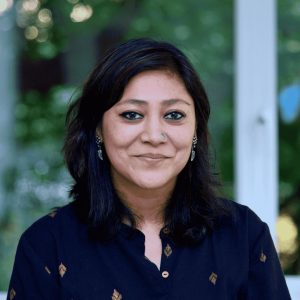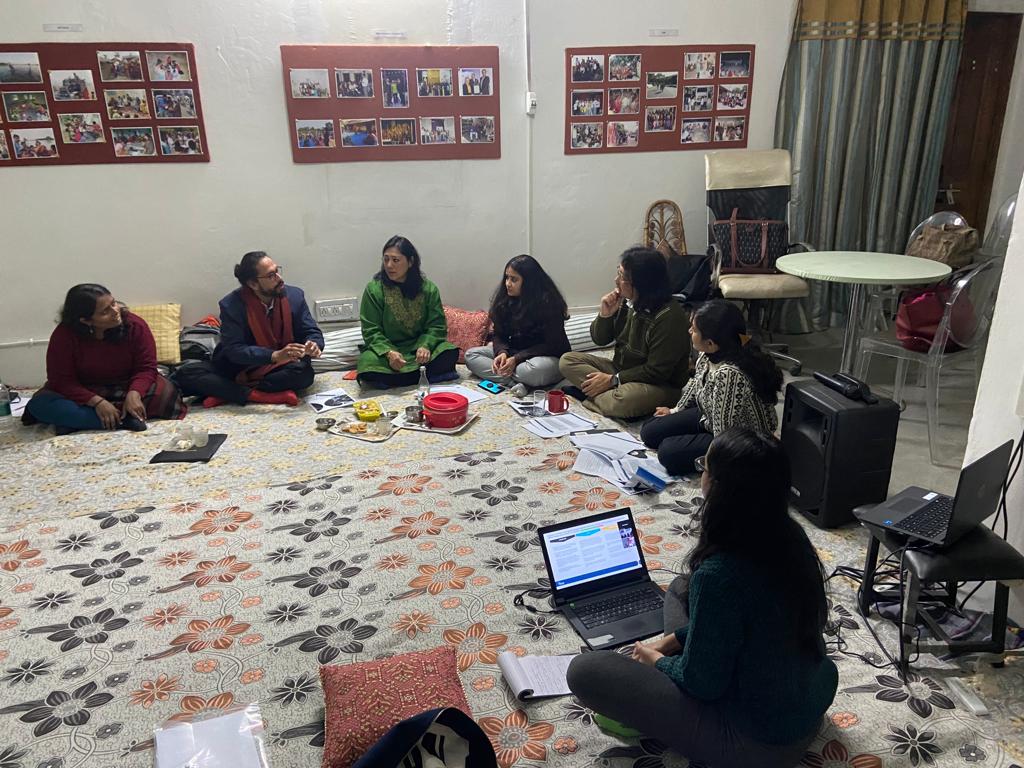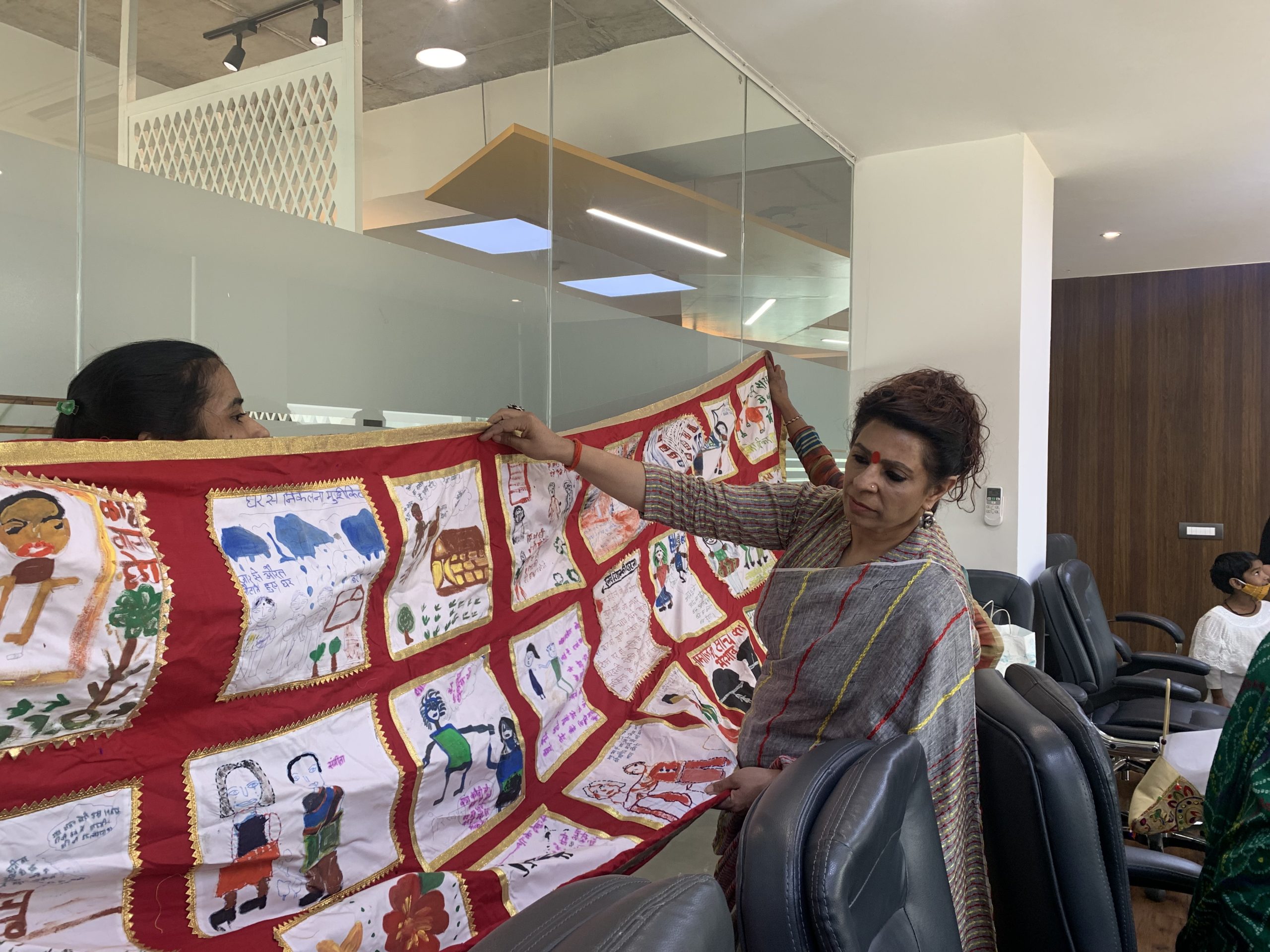Despite being set to be the world’s fastest-growing economy, India performs poorly in terms of women’s safety and gender equality. Nandita Pradhan Bhatt believes that gender-based violence and discrimination needs behavioural and attitudinal change. Ensuring dignity and safety at the workplace, especially for domestic workers is critical to the work that she has been doing over the years.
Nandita Pradhan Bhatt is the Director of the Martha Farrell Foundation, which has been working with a gender, equity, diversity, and inclusion lens since its inception in 2015, with the aim of preventing sexual harassment in the workplace. On the sidelines of Dasra Philanthropy Week, 2023, I had the opportunity to have a detailed conversation with Nandita on how Dasra’s Rebuild India Fund represents a new and much-needed model of giving in India while digging deep into how the Martha Farrell Foundation is fulfilling its commitment to ensuring gender justice.
Aarti Mohan: As an Investment Committee Member of the Rebuild India Fund, can you tell us a little bit more about it and what makes it unique in the way that it’s driving the resilience of grassroots organisations?
Nandita Pradhan Bhatt: The Rebuild India Fund is a fantastic fund that Dasra has, which supports very small grassroots organisations with flexible and unrestricted funding, which is a novelty. The idea is to support the agility that grassroots organisations already have, as was demonstrated during Covid, when they swiftly took up relief work with their own money. The Rebuild India Fund not only allows for this agility but also enables institutions to concentrate on ‘building’ their institutions.
During COVID, we realised the power of ‘no questions asked’ funding.
There is a detailed needs assessment on what actually each grassroots organisation needs. It is changing the way philanthropy is done by shifting the power dynamics and creating an equal playing field for organisations creating on-ground impact. The Fund, uniquely, asks questions about the wellness of the organisations, the leadership and the people working within it, and there is support given for wellbeing. There is also a change in the environment from one of competitiveness to that of collaboration.
At the heart of trust-based philanthropy is the accountability from both the funder and the grassroots organisation. In that context, is there an understanding of what this unrestricted flexible funding is being spent on? And do you see a behavioural pattern in the funders who are ready to fund this, in terms of what helps them build this trust?
The Rebuild India Fund has allowed grassroots organisations to experiment and conduct pilots for solutions that couldn’t be done earlier because of a lack of funds. Many are spending on capacity building, setting processes and systems in place, recruiting good talent for communication, fundraising and human resource management, and some are using it to spread the movement of their work for increased collaboration. Dasra is the binding force between everybody. Because the Rebuild India Fund is a pool of resources that funds multiple organisations, and so the trust of funders is in Dasra.
During Covid, we realised the power of ‘no questions asked’ funding. With support from Dasra, we developed an exceptional relief model that empowered domestic workers, who had lost their livelihood and were also highly vulnerable to abuse, to receive the funding and design programmes tailored to their requirements. As a result, the communities came out much stronger.
How was the experience at the Dasra Philanthropy Week, especially since it took place in person after two years?
The experience was very interesting and engaging. We were busy in multiple sessions, and the Rebuild India Fund initiatives were also going on where the first and second cohorts were meeting. There was diversity in the stakeholders that were present, there were more implementing partners and also of different regional languages. The Dasra Philanthropy Week allowed a safe place for civil society practitioners to take conversations forward towards the same movement and cause that everyone is a part of.
It’s been interesting for us to look at the focus areas and approaches that the Martha Farrell Foundation takes, so we’d love to know more about Martha Farrell Foundation’s work in India. How long have you been in India and how has the journey been?
Martha Farrell, the former director of Participatory Research in Asia (PRIA), was a gender equality leader. When she died in a terrorist attack in 2015, Dr Rajesh Tandon, PRIA’s Founder-President, established the Martha Farrell Foundation in her honour. I assumed the leadership at the foundation to carry on Farrell’s work, with a focus on preventing gender-based violence and promoting gender equality, especially among young people through the programme ‘Kadam Badhate Chalo’. This programme uses participatory research methodologies to empower young leaders and advocate for gender equality.
Another important step in this direction, which the Rebuild India Fund has enabled us to test, is to create a safe place for conversations with boys and men, and not from a perpetrator lens but to really listen to them and their mental health challenges. We are focusing on prevention of violence and discrimination through behavioural change.
The other programme is called ‘Making Workplaces Safe’ which is about gender mainstreaming, gender audits and prevention of gender-based violence in various institutions, including corporate offices, academic institutions, and informal workplaces. We also work with the district and state government to establish systems under The Protection of Women from Sexual Harassment at Workplace Act, 2013, such as setting up Local Complaints Committee (LCC) to address sexual harassment complaints against employers, especially by women in the informal sector. We also train the internal committees of formal organisations to take a survivor-centred and trauma-informed approach in dealing with women. We have a specific focus on domestic workers who are amongst the most vulnerable and marginalised groups with little space to negotiate for dignity and safety at the workplace.
Another important step in this direction, which the Rebuild India Fund has enabled us to test, is to create a safe place for conversations with boys and men, and not from a perpetrator lens but to really listen to them and their mental health challenges. We are focusing on the prevention of violence and discrimination through behavioural change.
It’s very interesting to hear about these safe spaces for men and boys, because this is a larger conversation that I have been listening to as well. How do you make sure that all of these different threads are tied together in the work that you do?
We tie all the threads together. For example: During the Covid-19 pandemic, violence against informal working women was particularly high in urban settlements. To address this issue, physical safe spaces were established where women could come, sit, and talk with one another, facilitated by other women. We brought together our programmes ‘Kadam Badhate Chalo’, ‘Dignity at Work’, and ‘Making Workplaces Safe’ in these centres. As a result, women also came together to form small businesses and called them ‘Swabhiman Kendras’. The women also started coming together to celebrate festivals and have fun together. Women began realising the importance of their voices and speaking their minds, and the children in their homes supported them. Even in our conversations with the corporates we talk about homes as workplaces and sensitise them about domestic workers. In our gender training, we create safe places for men and boys as well.
Institutional accountability is very important and is a big focus for us. Participatory research is the core methodology we follow, which is community-centric in nature. We also ideate with our communities to understand their needs. We also collaborate a lot to bring wide-scale change.
In light of what you’ve shared, I am interested in understanding the approach to grantmaking, such as who to work with, timelines for work, and grant structure. How do you tackle such deep-seated biases?
The Rebuild Fund allows us the flexibility to experiment and choose the programmes that we want to take forward. The Fund’s investment committee identifies credible organisations that align with certain criteria, such as being small, led by proximate leaders, community-driven and serving vulnerable communities. A decision is made based on these factors.
The Rebuild India Fund not only allows for this agility but also enables institutions to concentrate on ‘building’ their institutions.
We feel that this work is never going to end, and we have been working on it for years, but it still exists. We don’t take a top-down approach to solving the issue of violence and make sure it is community driven and owned. We build capacity and leadership within the community to take this work forward, and only then move ahead.
Looking ahead in terms of the Martha Farrell Foundation’s work and portfolio in India, what are the areas that you are looking forward to? Are there going to be any new areas of work?
Our organisation is exploring the possibility of expanding our work to Nepal where there is a law on sexual harassment in the workplace but it is not being enforced, and we aim to introduce our successful model from India. Although our primary focus will remain on addressing gender-based violence and discrimination, we intend to collaborate with more partners and share our methodology, including the Kadam Badhate Chalo model, which empowers young people to take ownership of defining gender issues in their own context and language and finding research-based solutions for their communities. Women’s safety issues have become an important topic in the G20 meetings as well.
Aarti Mohan is the South Asia Regional Representative at Alliance magazine.











Comments (0)